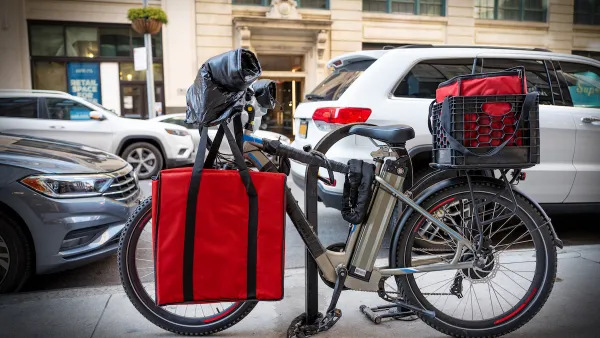Cargo bike producers and delivery companies say the proposed 120-inch length limit and emphasis on four-wheeled bikes excludes many commonly used delivery bikes and favors one manufacturer.

When the New York City Department of Transportation (NYCDOT) announced a proposed rule revision that would make way for larger cargo bikes in the city, bike advocates hailed it as a victory. But freight industry leaders say the change would outlaw some of the most common delivery bikes and skew the market toward one particular manufacturer, writes Gersh Kuntzman in Streetsblog NYC.
The new rules would explicitly allow four-wheeled, pedal-assist cargo bikes—just the kind that the city’s Department of Transportation is testing. But, as Kuntzman explains, “Those bikes are made by Fernhay, which is owned by a well-connected lawyer, William Wachtel.”
Kuntzman points out that “Industry leaders who were not Wachtel believe that the well-connected lawyer has some undue influence over the Adams administration — though such speculation is common when one company’s design is chosen over others’.”
According to Ben Morris of Boaster Cycles, “The 120-inch cap is going to eliminate all bike-and-trailer cargo solutions that currently operate in the market today and in the future.” The CEO of Net Zero Logistics said, “the suggested limit of 120 inches will force us to shut down, completely reengineer our operations or return to using vans for delivery.”
NYCDOT will hold just one public hearing on the issue on September 13.
FULL STORY: Industry Leaders Slam DOT’s Proposed Cargo Bike Rules

National Parks Layoffs Will Cause Communities to Lose Billions
Thousands of essential park workers were laid off this week, just before the busy spring break season.

Retro-silient?: America’s First “Eco-burb,” The Woodlands Turns 50
A master-planned community north of Houston offers lessons on green infrastructure and resilient design, but falls short of its founder’s lofty affordability and walkability goals.

Delivering for America Plan Will Downgrade Mail Service in at Least 49.5 Percent of Zip Codes
Republican and Democrat lawmakers criticize the plan for its disproportionate negative impact on rural communities.

Test News Post 1
This is a summary

Test News Headline 46
Test for the image on the front page.

Balancing Bombs and Butterflies: How the National Guard Protects a Rare Species
The National Guard at Fort Indiantown Gap uses GIS technology and land management strategies to balance military training with conservation efforts, ensuring the survival of the rare eastern regal fritillary butterfly.
Urban Design for Planners 1: Software Tools
This six-course series explores essential urban design concepts using open source software and equips planners with the tools they need to participate fully in the urban design process.
Planning for Universal Design
Learn the tools for implementing Universal Design in planning regulations.
EMC Planning Group, Inc.
Planetizen
Planetizen
Mpact (formerly Rail~Volution)
Great Falls Development Authority, Inc.
HUDs Office of Policy Development and Research
NYU Wagner Graduate School of Public Service





























